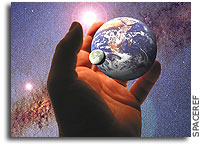 Michael Anissimov is guest blogging this month.
Michael Anissimov is guest blogging this month.One of the many useful terms that George has popularized is "Gainism" -- "reverential desperatism and misanthropism that is now the all too familiar opium promoted by the deep ecologists." I love the environment, but I think that the insipid SWPL, New York Times-inspired environmentalism held so dear by the farmers market crowd is the wrong way to go about helping our planet.
The reason why is that individual conservation is ultimately a losing game and improving our industrial manufacturing, energy, and agricultural processes are the only ways to avoid spewing garbage all over our pristine verdant globe. The global population is doubling about every 40 years, and any conservation efforts undertaken by the First World (less than a third of humanity) are ultimately dwarfed by exponential population increase worldwide. It hasn't been since the 70s that the world has taken a serious look at the population issue. Why? It's simply become too large to handle, so people ignore it.
First, let's take a look at manufacturing. All manufacturing is tremendously wasteful. This means that the best way to be environmentalist is to be poor -- have a small house, drive a small car, buy few products, don't travel in an airplane or to another country. That isn't a sexy, yuppie, New York Times-worthy lifestyle, now is it? The poor college student that lives in a dorm and bikes everywhere is doing ten times more for the environment than the rich yuppie that has a big house with good insulation, a veggie garden, drives a Prius, and goes on "eco-tours" to Fiji. One has the accessories of environmentalism -- one is actually helping the environment by being poor. Not going on an eco-tour to Fiji has a much smaller carbon footprint than going on one. Using a bike has a much smaller carbon footprint than driving a Prius.
The way to be a good environmentalist is to talk about and invest in strategies that impact the environment less whatever people believe -- I'd rather have a planet of people who don't explicitly care about the environment but have little impact on it due to the structure of their society than people who profess care but still drive cars and take airplanes everywhere. For manufacturing, that means investing in molecular manufacturing, synthetic biology, renewable building materials, new materials in general, and other potential routes to cheap, low-waste manufacturing, not buying endless trendy electronic gadgets that deposit heavy metals into our landfills.
Look at energy. Even the biggest environmentalists are starting to acknowledge that nuclear is the way to go. The waste generated by nuclear power plants is very low per kilowatt-hour produced, and burying it deeply underground in secure canisters really is a solution, whether it invokes positive emotional affect or not. Eventually, we will be able to shoot it off into space, but I have the feeling that we will develop the infrastructure to bury it securely underground instead. The anti-nuclear environmentalists are living in a fantasy world where they want us to go back to "nature" (the Pleistocene), neglecting the fact that billions would starve and go cold without modern industrial infrastructure. We have to choose the least damaging path -- not pretend that we can meet all our energy needs through solar and wind in the near future.
Consider agriculture. As Jamais Cascio and others have pointed out, meat consumption has a tremendous carbon footprint. I have pointed out to animal rights ethics professors at leading universities that we can never, ever get any substantial majority of the population to stop eating meat, because it's directly connected to feelings of masculinity and dominance, and besides, it tastes good. However, whether meat eaters like it or not, soy products are starting to approach the taste of meat, and the ultimate long-term solution is in vitro meat, pioneered by Jason Matheny and his non-profit, New Harvest. Eventually, everyone will be eating in vitro meat, because it will be healthier and cheaper, and macho meat-lovers who desire the experience of snuffing out the life of another animal to add to their own life force (a primitive desire grounded in sympathetic magic) will just have to whine about it until they get exhausted.
Deep ecology reaches an unjustifiable fever pitch when it advocates things like "keeping Antarctica pristine" -- the entire continent is nothing but a frozen wasteland populated by microbes and nematodes, if anything. Only a miniscule percentage, the coasts, is occupied by any form of complex life. Why not cover the whole damn thing with heated domes powered by' solar satellites? If the continent could be covered in billions of happy people leading fulfilling lives, wouldn't that be a lot better than a featureless ice sheet? Speaking of which, environmentalists should be the foremost advocates of space colonization, because there are millions of totally dead planets out there that we could be seeding with trees and life.
Well, I think you get my gist. Environmentalism is cool, but the way that people are going about it is all wrong. Now, I'm off to watch Fern Gully.
Michael's blog: Accelerating Future.

